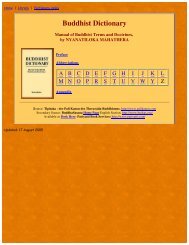The Three Basic Facts of Existence II: Suffering (Dukkha) - Buddhist ...
The Three Basic Facts of Existence II: Suffering (Dukkha) - Buddhist ...
The Three Basic Facts of Existence II: Suffering (Dukkha) - Buddhist ...
- No tags were found...
Create successful ePaper yourself
Turn your PDF publications into a flip-book with our unique Google optimized e-Paper software.
V<strong>II</strong>. <strong>The</strong> pursuit <strong>of</strong> Happiness and the Fact <strong>of</strong> <strong>Suffering</strong>In his Religions <strong>of</strong> man, Pr<strong>of</strong>. Huston-Smith defines man as “the animal that wonders.” This veryapt description automatically implies that within every individual <strong>of</strong> the genus homo sapiens isa built-in mechanism which impels him to seek knowledge. He wants to know. This urge beginsto assert itself at a very early age, in very young children, who begin to ask questions abouteverything they see and touch and sense. Kipling has expressed this in the lines:I keep six honest serving men,they taught me all I knew.<strong>The</strong>ir names are What, and Why, and When,and How, and Where, and Who.This in turn means that man is the only member <strong>of</strong> the animal kingdom who is capable <strong>of</strong>asking questions and <strong>of</strong> reasoning. <strong>The</strong> salient point in this process is to ask the right questions,and even more important is the order in which the questions are asked. <strong>The</strong> question that hasintrigued man the most (probably before the dawn <strong>of</strong> history), and that still intrigues him, is,how did everything begin? Various answers to this question are to be found within the religionsand philosophies <strong>of</strong> the world. Greek philosophy—commenced with the question <strong>of</strong> trying t<strong>of</strong>ind out whether there was any kind <strong>of</strong> primordial substance <strong>of</strong> which the world was made. <strong>The</strong>Greeks made surprising progress working on this line <strong>of</strong> thought, culminating in the school <strong>of</strong>the atomists, Leucippus and Democritus, who anticipated the discoveries <strong>of</strong> modern times bymore than two thousand years.<strong>The</strong> various religions approached the subject in an entirely different manner. <strong>The</strong> Greeks, inthe beginning, at least, were concerned solely with the physical universe.<strong>The</strong> idea <strong>of</strong> a first cause was not introduced until the advent <strong>of</strong> the Socratic school (Socrates,Plato and Aristotle) and was seized upon with eagerness by the early fathers <strong>of</strong> the Christianchurch because it dovetailed so neatly with their own concept <strong>of</strong> a divine originator, God thefather, Jehovah, whom the Christians took over from the ancient Hebrews. However, Brahma <strong>of</strong>the Indian systems and Ahura Mazda <strong>of</strong> the Zoroastrians are very similar concepts into whichwas breathed the wishful thinking <strong>of</strong> their adherents. This First Cause, this Supreme Being, thisGod the Creator, was endowed with omnipotence and omniscience, with being all-merciful, allwise,all-just and absolute in every sense. He is, in fact, <strong>of</strong>ten referred to as <strong>The</strong> Absolute. And,as we read in the first chapter <strong>of</strong> Genesis, having created everything, the Lord God was verypleased:“And God saw everything that He had made, and, behold, it was very good.”This appraisal was made somewhat prematurely, and turned out to be not entirely correct. <strong>The</strong>authors <strong>of</strong> Genesis found to their dismay that they had struck more than they had bargained for.If everything were so good, how to account for all the suffering in the world? Surely all theterrible things that the flesh was heir to, and all the multifarious evils that befell living creatures,could not be attributed to a Just All Good, All Merciful, and All Wise Being! So, to overcome thecontradiction, the Devil had to be invented, Lucifer, “son <strong>of</strong> the morning,” who has exercised afascination, not only over some <strong>of</strong> our finest writers and poets, to wit, Milton, Goethe, Dante,and more recently, D. H. Lawrence, but also on by no means an insignificant number <strong>of</strong>otherwise quite ordinary people whom one would not have expected to have been given t<strong>of</strong>lights <strong>of</strong> fancy. D. H. Lawrence was inspired by his satanic majesty to write the poem,“Lucifer”:25
















